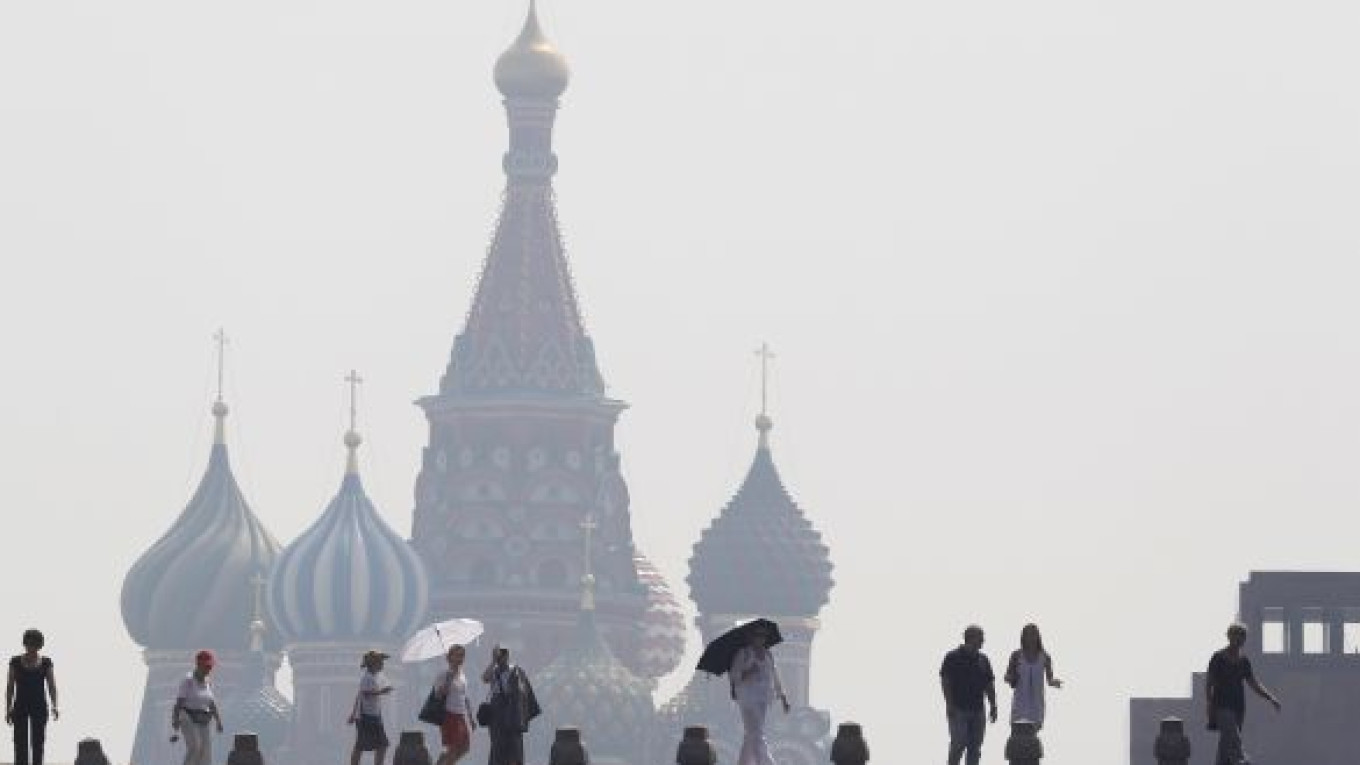Muscovites sweltered Monday as the temperature soared to 37.4 degrees Celsius, the hottest day on record, all while being forced to endure the capital's worst smog cloud since 2002.
The thermometer at the All-Russia Exhibition Center recorded the mark at 3 p.m. for the hottest temperature since records began 130 years ago, the city weather service said. That surpassed the previous high of 36.8 C, set in July 1920 during the Civil War.
The mercury may rise to 38 C on Thursday, according to Gidromettsentr, the state weather service.
Unusually high temperatures have contributed to record drowning deaths across Russia, a statistic that has increased by 688 in the past three weeks, Rossiiskaya Gazeta reported Friday, citing Emergency Situations Ministry data. Most of those who drowned were intoxicated, the state newspaper said. Another 39 people died Sunday, the ministry said on its web site.
The heat wave has also hit Russia's economy, as drought damaged 10.1 million hectares, or 32 percent of all land under cultivation, Agriculture Minister Yelena Skrynnik said Friday.
The country's chief health official has urged companies to adopt a siesta regime of breaks for workers during the hottest part of the day to avoid injury and illness. Officials have also urged farmers to start harvesting at night to protect their combines from mechanical failure.
Muscovites' misery was compounded by thick smoke from burning peat bogs east of the city. The Emergency Situations Ministry said 34 peat fires and 26 forest fires were blazing Monday in the Moscow region, covering 59 hectares.
Two Il-76 transport planes, capable of carrying 42 tons of water, and a Be-200 amphibious plane were fighting the fires, the ministry said.
Airports serving Moscow were unaffected by the thick smoke, whose sharp, cinder-filled smell permeated the city and crept into offices, homes and restaurants via windows and doors.
“This is awful. It is going to damage people’s health,” said telephone engineer Davit Manukov, 25, standing by the Kremlin, where black clouds of smoke enveloped its golden onion domes.
The Emergency Situations Ministry said it was the worst such pollution since a smog outbreak in 2002, which was also a result of smoke from fires caused by hot weather.
The Moscow government agency overseeing air pollution, Mosekomonitoring, said the amount of harmful impurities in Moscow’s air exceeded the norm by five to eight times.
“The environmental situation in Moscow has become unfavorable,” its chief specialist, Alexei Popikov, said by telephone, adding that it would last several days.
The elderly and those suffering from heart disease should try to avoid contact with the smog, Popikov said, adding that the levels of carbon monoxide and nitrogen oxide were high.
The Emergency Situations Ministry appealed to residents and vacationers to stay away from forests.
(Bloomberg, Reuters, MT)
Moscow metro chief Dmitry Gayev has dismissed as “absurd” a lawsuit that complains the city's subway system violated passengers’ rights by allowing temperatures to exceed regulated norms.
“Let’s also sue the sun for being so hot,” Gayev told reporters, Interfax reported. “This claim is like going to court over the fact that peat fires are burning in the Moscow region.”
A nongovernmental group, the Society for Protection of Consumer Rights, said in a lawsuit filed last week that temperatures in some stations have reached 32 degrees Celsius, well above the maximum 28 C stipulated in state regulations.
A Message from The Moscow Times:
Dear readers,
We are facing unprecedented challenges. Russia's Prosecutor General's Office has designated The Moscow Times as an "undesirable" organization, criminalizing our work and putting our staff at risk of prosecution. This follows our earlier unjust labeling as a "foreign agent."
These actions are direct attempts to silence independent journalism in Russia. The authorities claim our work "discredits the decisions of the Russian leadership." We see things differently: we strive to provide accurate, unbiased reporting on Russia.
We, the journalists of The Moscow Times, refuse to be silenced. But to continue our work, we need your help.
Your support, no matter how small, makes a world of difference. If you can, please support us monthly starting from just $2. It's quick to set up, and every contribution makes a significant impact.
By supporting The Moscow Times, you're defending open, independent journalism in the face of repression. Thank you for standing with us.
Remind me later.


